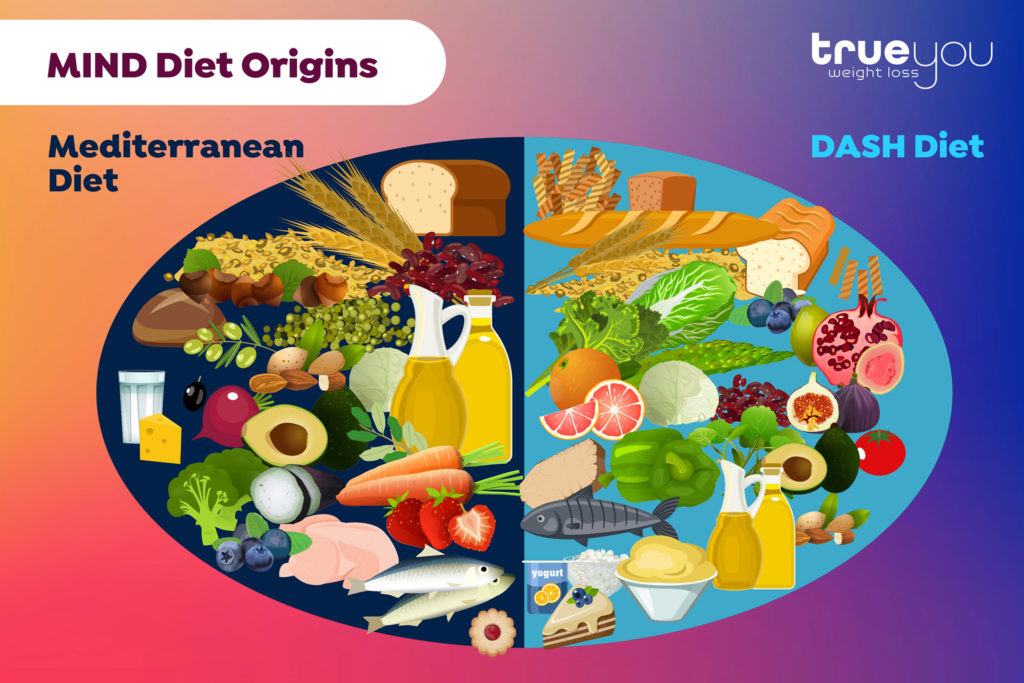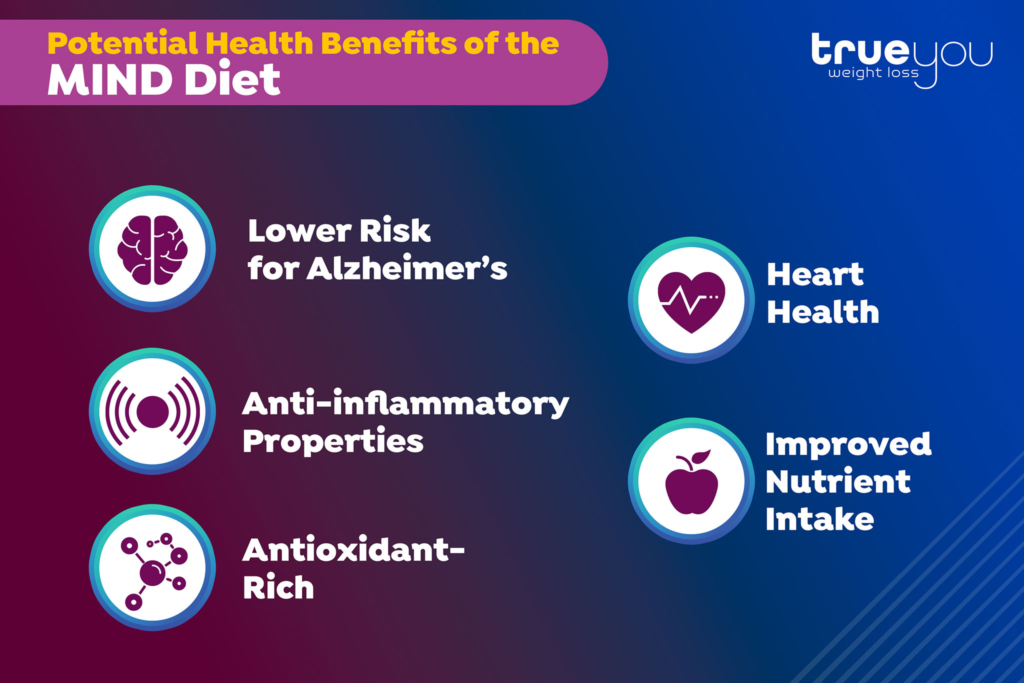MIND Facts | MIND Diet Origin | How does MIND Diet Work? | MIND Diet Benefits | MIND Diet Weight Loss | Experts Say | Bottom Line
According to the Centers for Disease Control and Prevention (CDC), one of the top ten leading causes of death in the United States is Alzheimer’s disease. There are already upwards of six million Americans living with Alzheimer’s today, and that number is expected to more than double by 2050. While it is possible for younger people to get Alzheimer’s disease, it primarily affects adults over the age of 65; as the size of the U.S. population over 65 continues to grow, so too will the societal and economic burden of the disease.
Research into Alzheimer’s and other neurodegenerative diseases is ongoing, but these conditions are still not well understood by doctors. To date, there is no cure for Alzheimer’s, and even the standard treatments are useful for addressing some symptoms rather than reversing or stopping its progression. In light of this, new approaches to treatment have emerged that focus on lifestyle factors like diet. One promising avenue is the MIND diet, a diet plan and eating pattern that was specifically designed to protect against dementia and cognitive decline.
Alzheimer's disease is a progressive neurodegenerative disorder that primarily affects the brain in a way that results in cognitive decline and memory impairment. It is the most common cause of dementia, a syndrome characterized by a significant loss of cognitive function and which affects a person's memory, thinking, behavior, and ability to perform typical daily activities. The symptoms gradually worsen over time, causing significant distress especially for the afflicted person’s family and friends. Like other neurodegenerative diseases, the nature and cause of Alzheimer’s are still poorly understood.
The disease was first described in 1906 by Dr. Alois Alzheimer, a German psychiatrist and neuropathologist. Several years earlier, in 1901, Alzheimer began seeing a patient named Auguste Deter in a Frankfurt asylum. Over the next five years, he observed as she experienced severe cognitive decline and memory loss. When she eventually died in 1906, he was able to analyze her brain tissue and found abnormal protein deposits and fibrous “tangles” that are now considered the primary markers of the disease that bears his name.
As Alzheimer's disease advances, patients may experience difficulties with short-term memory, language problems, disorientation, mood swings, and changes in behavior. Simple tasks that were once routine may become challenging, and individuals may require increasing levels of assistance with daily activities. Additionally, even beyond the personal and familial challenges associated with these changes, the disease can also be a burden on society at large. According to the Alzheimer’s Association, it is estimated that treatment for Alzheimer’s and dementia costs the country $345 billion each year; moreover, over millions of people provide unpaid care for family members afflicted with the disease.
Despite decades of research, the cause of Alzheimer's disease is still not known. What is clear, however, is that advancing age is the most significant risk factor, and this risk increases once a person reaches the age of 65. Genetic factors, lifestyle choices, and certain medical conditions may also play a role in its development, but more research is needed. Current efforts to understand and treat the disease are focused on early diagnosis, slowing the progression, and managing the symptoms.

As more is learned about Alzheimer’s and similar neurodegenerative diseases, researchers have been trying to identify new treatments that might make a difference. In 2015, a research team at the Rush University Medical Center in Chicago published a paper that described a new kind of diet that was specifically designed to prevent neurodegeneration and age-related cognitive decline. The team, led by nutritional epidemiologist Martha Clare Morris, utilized components from two other well-known diets—as well as extensive research on foods that have been shown to improve cognitive function—to develop the MIND diet.
The very name of the MIND diet is a nod to its origin: Mediterranean-DASH Intervention for Neurodegenerative Delay. The reason the Rush University team borrowed from the Mediterranean and DASH (Dietary Approaches to Stop Hypertension) diet plans is because they are both well-regarded in the medical community for being demonstrably effective for their aims. Below is a summary of each of these diets:
Extensive research over recent years has shown that each of these diets is effective in its own way; the Mediterranean diet has been shown to reduce the risk of early death and chronic disease, and the DASH diet does indeed reduce hypertension and the risks of associated conditions. Moreover, the data indicates that each can also be a helpful framework for losing weight. Numerous medical organizations like the American Heart Association have examined these diets and found that they both also provide a variety of health benefits even beyond their stated purposes.
So when the researchers at Rush University started devising an eating plan that could be beneficial for brain health, they started with these two diets. They found that even though the Mediterranean diet and DASH diet were not designed with brain health in mind, they had nevertheless demonstrated some neuroprotective properties. The team was able to identify the specific foods and food categories that are now known to bolster brain function or slow the kinds of decline in cognition that are common in Alzheimer’s and dementia patients.
Even though the MIND diet is a “diet,” it is much more focused on emphasizing nutrient-rich foods than calorie restriction. The foods included in the diet were selected specifically because they are believed to support cognitive function and protect against neurodegeneration. It is also consistent, however, with other diets and meal plans that highlight healthy eating in general as well as moderation and regular physical activity. Below is the basic structure of how the MIND diet works and the number of recommended servings for each food group:
In addition to the foods above that are the main focus, the MIND diet also identifies a number of unhealthy foods that should be eaten only in moderation. In general, these foods are higher in saturated or trans fat:
The MIND diet allows for a certain amount of flexibility and adaptation so that different people can account for their personal preferences and dietary needs. As long as you’re incorporating brain-healthy foods and reducing intake of foods that should be limited, there are any number of ways to adapt the diet in a way that suits you. Like the Mediterranean diet and DASH, the MIND diet isn’t particularly considered with ensuring a calorie deficit. Ultimately the main purpose of the diet is to boost brain function and slow the rate of cognitive decline.

Both of the diets the MIND diet is based on have been researched thoroughly over time, and there is strong evidence that adherence to them can lead to a lower risk of conditions like hypertension, cardiovascular disease, and type 2 diabetes. This is also part of the reason the Mediterranean and DASH diets were models since these medical conditions are all considered risk factors for Alzheimer’s disease. But in addition to reducing the risk for Alzheimer’s, the MIND diet also provide a variety of other potential health benefits:
As noted above, the MIND diet was specifically developed as a means of reducing the rate of cognitive decline that can lead to Alzheimer’s and dementia; however, there is some evidence that the diet can also promote weight loss. For instance, a recent study associated with the National Institute on Aging looked at 604 adults over the age of 65 who were considered overweight (BMI greater than 25). One group followed the MIND diet and the control group followed their usual diet. Though the focus of the study was cognitive performance and both groups lost some weight, the researchers found that the group on the MIND diet had improvements in overall diet quality.
Like the DASH and Mediterranean diets, the MIND diet can potentially work for weight loss primarily because of the general emphasis on nutrient-dense, whole foods. The average American diet tends to involve a lot of processed foods that are high in the saturated fats and simple sugars that are known to contribute to weight gain. By switching to the MIND diet, there are several factors that make weight loss more likely:
Because of the MIND diet’s central focus on preventing or slowing down cognitive decline, there hasn’t been much research to date on its potential for weight loss. Indeed, weight loss is a complex process that is influenced by various factors, including individual metabolism, physical activity levels, and overall lifestyle habits. The MIND diet has a number of characteristics that can be beneficial for weight loss, but the amount of weight you can lose will vary greatly from person to person.
Kathleen Walton, MS, RD, LDN and Lori Gooch, RDN, LDN, registered dietitians at True You Weight Loss, offers some insight into commonly asked questions about the DASH diet:
What are the pros of the MIND diet?
What are the cons of the MIND diet?
What have you found people are generally unaware of when considering the MIND diet?
Do you have firsthand experience with the MIND diet, whether it's something that you've personally tried, or have seen others be successful or unsuccessful with?
How much weight do people typically lose with the MIND diet?
For someone that might be considering the MIND diet, what alternative options should they consider and why?
The MIND diet is a relatively new dietary approach to curbing the growing trend of neurodegenerative diseases like Alzheimer’s. So far, the results are promising, and the diet looks like it can make a substantive difference in delaying cognitive decline. The good news is that virtually anybody else could also benefit from following the MIND diet. The focus on nutrient-dense, whole foods and regular physical activity make it an overall healthy diet that can also even lead to weight loss. The bottom line: just like the DASH diet and Mediterranean diet it’s based on, the MIND diet is a solid and reliable approach to dietary health that anyone could consider.
If you’re looking to lose weight, the MIND diet is one option that has a scientifically robust basis. The truth is, though, that it’s difficult to lose weight no matter which diet you pick. In fact, decades of research continues to show that most people aren’t successful with losing weight and keeping it off over the long term. It is all-too-common for people to quickly get frustrated by the effort or perhaps lose a little weight and then regain it after a few months.
At True You Weight Loss, we want to offer a new way to think about weight loss that can make a long-term difference in your life. We specialize in endobariatric procedures like ESG that are designed to promote permanent lifestyle changes that can lead to sustainable weight loss. If you’re like many other Americans and have repeatedly tried and failed to lose weight in the traditional way, it may be time to consider a new path. To learn more about True You and how we can help, please contact us today to request a consultation.

Dr. Christopher McGowan, MD, a leader in endobariatrics, specializes in non-surgical obesity treatments and is triple-board-certified in Internal Medicine, Gastroenterology, and Obesity Medicine. Renowned for pioneering endoscopic sleeve gastroplasty (ESG) with over 2,000 procedures, his global influence and research contributions define him as a top expert.



